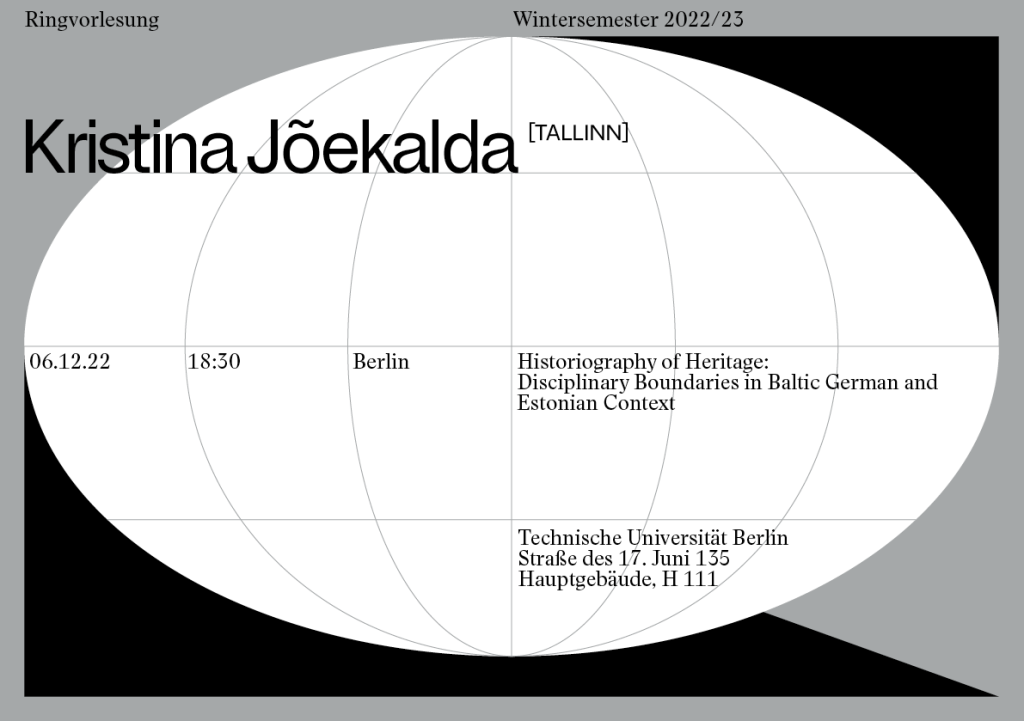Kristina Jõekalda (Tallinn): Historiography of Heritage: Disciplinary Boundaries in Baltic German and Estonian Context
Heritage Studies came into being in the 1980s, falling into an era in Estonian history that was associated with monuments more closely than ever. According to the slogan of the Soviet Estonian heritage movement (muinsuskaitseliikumine) of late 1980s its ultimate goal was to restore nothing less than the most important of the country’s antiquities – interwar independence. Where are the roots of these processes?
‘Heritage’ has remained a marginal concept for much of Western art history. There are cases, where a clear boundary between Art History and Heritage Studies can be drawn, and others, where this boundary is very ambivalent. My research material – early texts on the history of Baltic architecture and its preservation – tends to fall into the latter category, and this space in between is exactly what the talk will tackle. While Art History is a discipline that is very much absorbed with its own history and origins, Heritage Studies mostly tends to limit itself to recent or even contemporary concerns. Yet, as David C. Harvey has argued, the questions the field of Heritage Studies raises – the connections between monuments and processes of identity formation, the ever changing valorisation of monuments, the ways they could unify a society, the relationship between academic and popular research, up to dangerous kinds of connections to nationalism and colonialism – are extremely relevant in historical, 19th-century contexts as well.
My talk will address these disciplinary boundaries, looking at the transition from the Baltic German Heimat to the Estonian nation state, and how the arfterlives of these processes still keep affecting our approaches today. 19th- and early-20th-century Baltic German scholars of that era were following pace foremost with their German colleagues, but which ones and how exactly? Since the Estonian nation state was formed in 1918, Estonian scholars sought to widen their horizons of international role models. How far away from the narratives of previous German-language scholarship did the existing boundaries and hierarchies of the art historical discipline actually allow them to drift? How close were publications in both languages to openly political aims? And does the perspective of heritage enable to uncover any new or neglected topics?
Kristina Jõekalda is Associate Professor and Senior Researcher at the Estonian Academy of Arts, Tallinn. She has studied art history there and general history at the University of Helsinki. In 2018 she was a Visiting Fellow at the Humboldt-Universität zu Berlin (financed by Böckler-Mare-Balticum-Stiftung); in 2022 a Postdoctoral Associate at Yale University. Her dissertation was entitled „German Monuments in the Baltic Heimat? A Historiography of Heritage in the ,Long Nineteenth Century‘“ (Tallinn 2020). Her research and teaching is concerned with the history of art and architecture, historiography and heritage preservation in the Baltic region, in the context of nationalism and colonialism. She has co-edited the volume „A Socialist Realist History? Writing Art History in the Post-War Decades“ (Vienna/Cologne/Weimar 2019), and the special issues „European Peripheries of Architectural Historiography“ (The Journal of Architecture 2020) and „Debating German Heritage: Art History and Nationalism during the Long Nineteenth Century“ (Kunstiteaduslikke Uurimusi / Studies on Art and Architecture 2014).
Technische Universität Berlin
Straße des 17. Juni 135, Hauptgebäude, H 111
